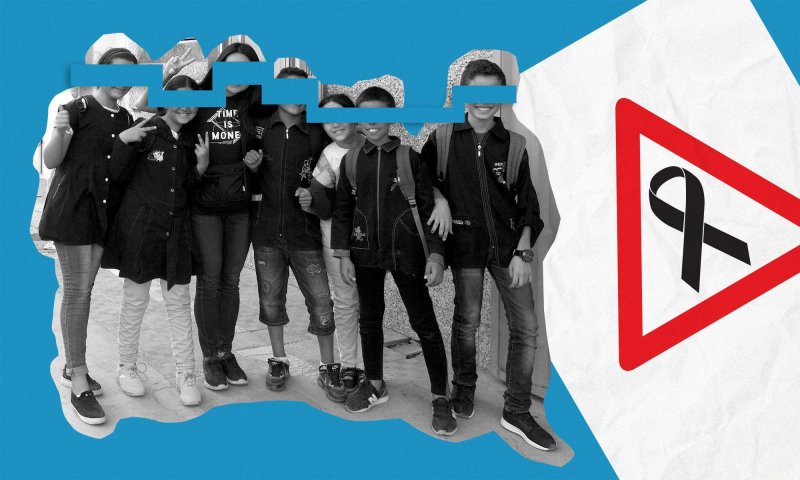As the school term resumes around the Arab world, the price of school supplies take centre stage again. Stories of “Carcinogenic” school supplies disturb officials especially since many parents opt for these products which are much cheaper than local or imported stationery.
In Tunis, Yasser Ben Khalifa the Director of Competition and Economic Research at the Ministry of Commerce warned on August 20 that there are large quantities of "carcinogenic" school supplies smuggled into the country, stressing that the government have been confiscating "tons" of these products annually.
Poisonous Pens in Tunisia
The Tunisian official explained that there are quantities of various supplies, such as erasers, pencils and pens smuggled into the country that are poisoning students, calling on parents to forgo purchasing such supplies from informal markets and instead opt for stationery shops & trading points which are under technical supervision.
This type of merchandise is usually sold in the black market, just before the start of the school year, but remains available throughout the year, despite the authorities attempts to shut down the stalls of vendors of these products.
In September, a Tunisian security official warned against the illegal sale of smuggled school supplies mostly made of petrol, asphalt and pork manure, “which are harmful to students” and stated that 35,000 such items had been confiscated. While the General Manager of the Tunisian National Institute for Consumers Tarek Ben Gazieh said that pencils containing carcinogenic substances that affect children’s reproductive organs were confiscated by the authorities along with a number of other supplies.
The Tunisian Ministry of Health issued warnings around the same periods regarding students purchasing such supplies cautioning that the use of such products led to “short term side effects such as allergic reactions, rashes and long term side effects like kidney diseases or cancer”. Most of these goods come from China and include children's toys. In April, Tunisian authorities seized huge quantities of toys smuggled from China to Algeria and Tunisia, valued around US$ 2.4 million, declaring them “carcinogenic”.
Algeria: Counterfeit Stationery
The crisis of the availability of school supplies of unknown source presenting a health hazard surfaces with the start of each school year in Algeria. In August, local media reports documented that there was high demand among Algerians for "unusual" school supplies describing how students and their families were being tricked by "the attractive design of these dubious Chinese products."
In 2015, the head of the Consumer Protection Association, Mustapha Zebdi, confirmed that these "suspect" school supplies were mostly imported from China, threatened the lives of 8 million Algerian students annually and appealed to the authorities to tighten controls in the weeks leading up to the school year.
With another school year upon us, a good portion of students in Arab North Africa will be given carcinogenic stationery, most flooding the unregulated low end market.
Parents justify the purchase of such products due to "difficult circumstances" especially with prices rising steadily. However, experts stress that this is like "buying death for children at a cheap price".
The Algerian National Assembly for Trade issued a report in 2016 indicating that 80% of school supplies traded in the market are imported often coming from China and some of them enter the country illegally and are not subject to any scrutiny to verify that they are safe for use and have no negative health impact on consumers.
Several organizations in Algeria have warned against the dangers of these supplies especially those made of plastic or rubber, which have led to cases of children poisoned after chewing or touching them.
Morocco: Official Warnings
In Morocco, The Moroccan Consumer Forum warned last year that there were carcinogenic school supplies in the market.
The Forum urged the authorities to monitor the sources of supplies such as covering material, notebooks, pencils and other items to ensure that they do not contain toxic or chemical substances beyond globally acceptable levels.
The warning came after local media reports revealed the spread of school supplies imported from China and other countries carrying “carcinogens” in 2017.
Egypt: Made From Garbage
In Egypt at the beginning of the school term authorities in the northern governorate of Port Said seized more than 300 articles (water-bottles and children’s lunchboxes) of unknown origins and made of recycled garbage after being treated with “harmful poisonous chemicals and emitting a noxious smell”
In 2017, a security crackdown in the country resulted in the seizure of more than 42,000 non-conforming stationery articles.
The year 2015 saw the confiscation of about 5 million smuggled and "counterfeit” items. Local media reports at the time confirmed that more than 40% of school supplies available on the market were "of unknown origin and unsafe for student health."
According to experts, use of these badly made water bottles and lunch boxes cause students stomach aches & intestinal catarrh while shoddy notebooks and books have been reported as being responsible for the spread of eye and skin infections among students and their pungent smell harm the respiratory system.
Difficult Circumstances
In general, the reasons for the popularity of such poorly made and unsafe supplies in many Arab countries is their “low price” and “attractive” colours and shapes, which are often decorated with popular cartoon characters appealing to children, and these products are often released into the market a few days before the beginning of the school term.
Many parents justify the purchase of such products due to “difficult circumstances” especially with prices rising steadily. However, experts and officials stress that this is like "buying death for children at a cheap price”.
Raseef22 is a not for profit entity. Our focus is on quality journalism. Every contribution to the NasRaseef membership goes directly towards journalism production. We stand independent, not accepting corporate sponsorships, sponsored content or political funding.
Support our mission to keep Raseef22 available to all readers by clicking here!
Interested in writing with us? Check our pitch process here!



